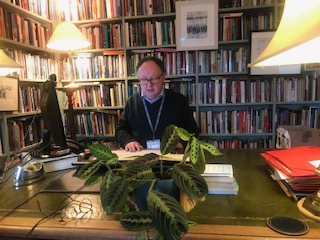James Woodward Reflects On Reading the Authorised Biography of John Habgood, Archbishop of York,1983 -1995. (David Wilbourne SPCK 2020)
The wonderful thing about Sarum College Bookshop is the unexpected discovery or something that you just can’t resist buying! This biography was one of those encounters and gladly I purchased it and brought it home to read! It is a mark of the books quality that it has encouraged me to reconnect with my blogging and so here goes…
I have had the privilege of working for the Church of England since 1985 in a number of places ending up in my appointment to Sarum College in 2015. I am a Durham lad, sponsored, by that Diocese for ordination and serving my curacy in Consett. So some of the time ( and place) covered in this book coincides with my ministry. I am interested in the journey that the church has taken over these decades. Its struggles and perplexeties and contradictions are in part mine.
I remember as an ordinand a gathering at Auckland Castle ( it may have 1979) and being quite overawed both the size of its private chapel and the splendour of the throne room where we gathered. into this space walked John Habgood – tall, calm, with an authority and a distance that was memorable! At the gathering he showed us the proof pages of the Alternative Services Book – the story of which is narrated in chapter 15. Add to this my own roots in the soil of County Durham and some understanding of episcopal ministry as chaplain to Richard Harries when the Crockford’s preface unsettled the Church in 1987 ( see chapter 19). Combine these experiences with a professional interest in the politics that go with any institution and those who seek to influence, persuade, and use power for all kinds of ends – and this may account for my interest in this book!
Understanding the church, appreciating the complexities of leadership, nurturing a kindness and sympathy for human weakness and limitation all form part of this carefully researched and well written biography. The two and a half pages of commendations are a tribute in themselves of the respect that Lord Habgood was held. His qualities of mind, his discipline and judgement, his skill in Christian apologetics are all celebrated in these chapters.
For those interested in the role of the Church of England and its legitimacy in relation to the State will discover in this biography an account of its credibility and engagement with the Head of State, a number of Prime Ministers, its voice in the House of Lords and as a contributor to thought leadership. How much of this is related to the strength of affection nurtured by friendships, a wider appeal and appreciation of the nature of faith, the strength of Church support through communities across our land is hard to evaluate. However what is described here is a practical, pragmatic ‘middle way’ that supports a progressive embrace of social change. Habgood, along with others, through his intellect and commitment to truth, ensured that theology had a place around the table of public life. His contributions to the dialogue between religion and science have certainly secured a legacy as one of the leading intellectuals over the past one hundred years.
Wilbourne navigates the complicated relationship between the public and private face of John, the human being, with skill. As a former Chaplain of Habgood (1991-1994) there is a clear respect and an appropriate generosity. The remembering strives to include the reality that many experienced Habgood as aloof and cool. In remembering others we often overlook our own projections and insecurities. None of us can expect those who lead to meet all our needs. We are all work in progress and the deeper we dig into our humanity the greater and more liberating is our grasp of contradiction, ambiguity and paradox. Habgoods writing bears powerful testimony that.
Disappointments and failures combined with disagreements around ‘fundamentals’ are here in abundance. Ecumenical partnerships especially with the Methodist Church ( Chapter 16), the acceptance and affirmation of sexual diversity and inclusion, the significant failures in safeguarding, the all too slow movement to ordain women, the Act of Synod ( chapter 21) are all discussed. We await the skilled historian to tackle some of the detail and socio-political influences that shaped these debates, decisions and power struggles – and what (if any) role they might have played in the change (and some would use the word decline) of the Church of England.
So – how would you like to be remembered ? Accurately ? Of course ! Generously ? Hopefully! Truthfully – certainly.
While we have time we might want to exert some influence over this remembering. Few of us may have the power and influence of Lord Habgood – but there is plenty that we can do for the common good and change the world.
The Revd Canon Professor James Woodward is Principal of Sarum College. Visit James’s blog for more reflections and reviews.

Leave a Reply